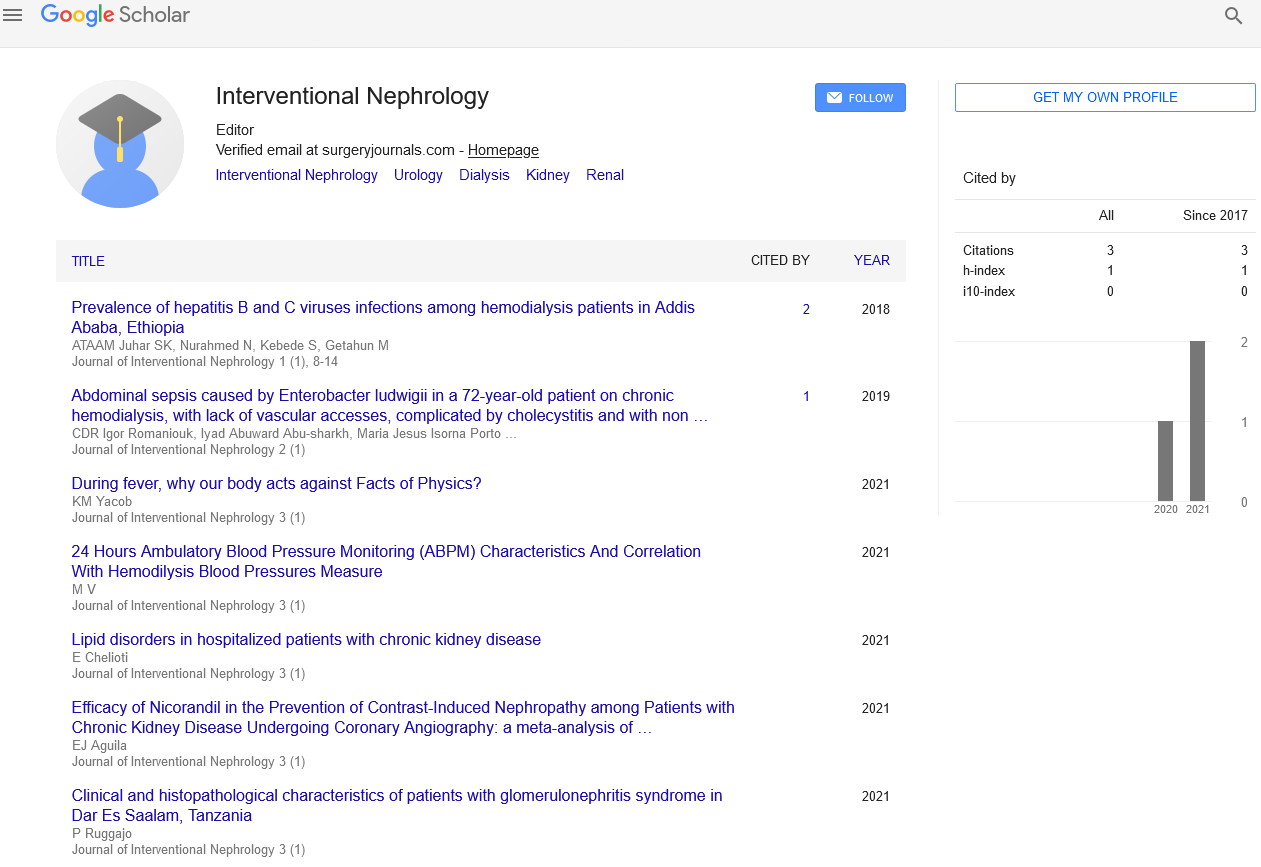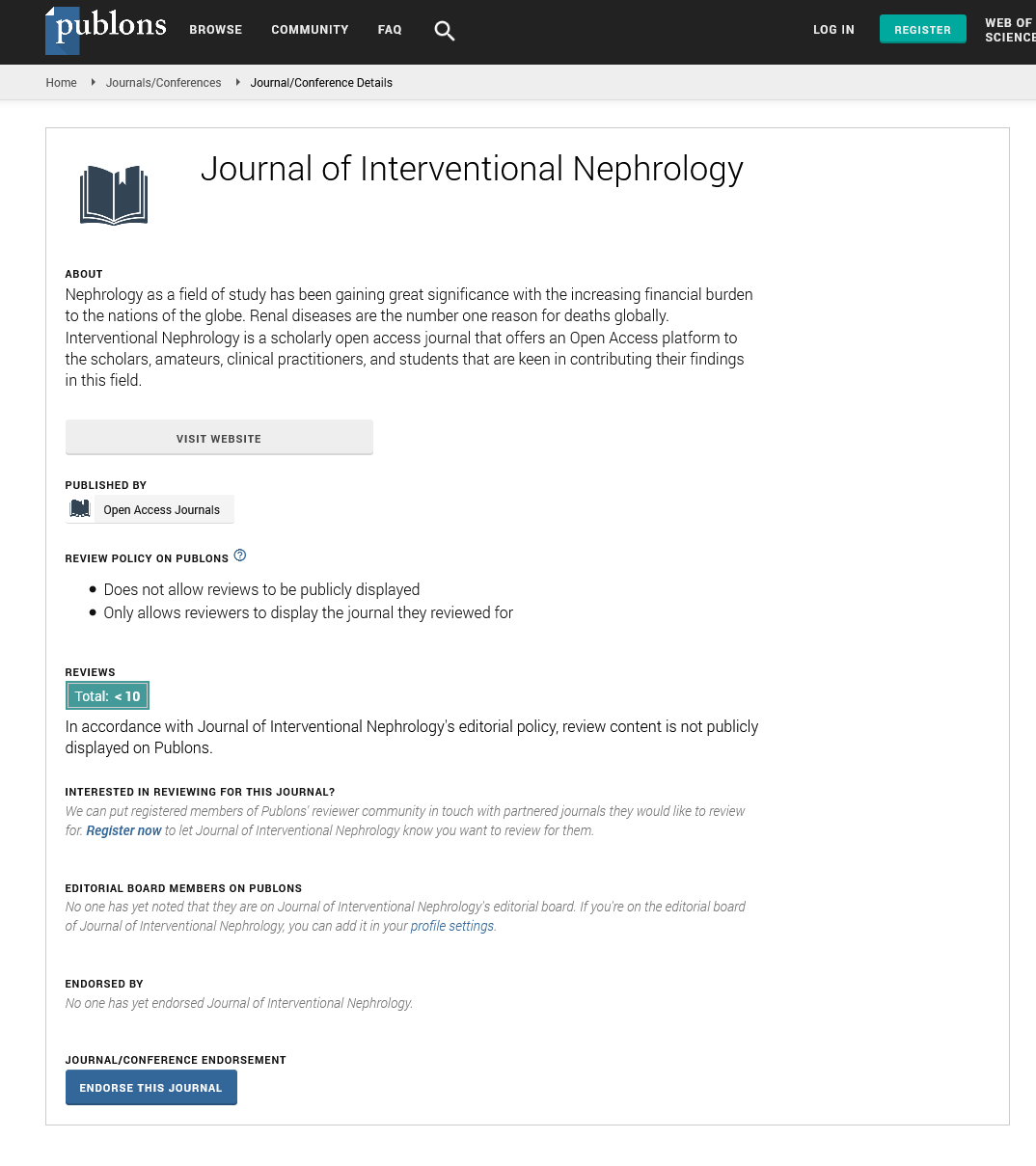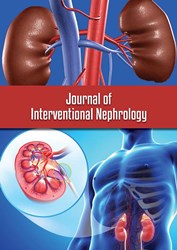Perspective - Journal of Interventional Nephrology (2024) Volume 7, Issue 6
Kidney Disease and Aging: Understanding the Connection
- Corresponding Author:
- Paolo Gotloib
Department of Nephrology,
Drexel University,
Egypt
E-mail: PaoloGotloib7333wes.en@edu
Received: 20-Sep-2024, Manuscript No. OAIN-24-148466; Editor assigned: 23-Sep-2024, PreQC No. OAIN-24-148466 (PQ); Reviewed: 07-Oct-2024, QC No. OAIN-24- 148466; Revised: 01-Nov-2024, Manuscript No. OAIN-24-148466 (R); Published: 08-Nov-2024, DOI: 10.47532/oain.2024.7(6).354-357
Introduction
As individuals age, the risk of developing chronic diseases increases, and kidney disease is no exception. The kidneys, vital organs responsible for filtering waste, regulating electrolytes, and maintaining fluid balance, undergo changes that can predispose older adults to various renal conditions. Understanding the relationship between kidney disease and aging is crucial for improving health outcomes in the elderly population. This article explores the mechanisms through which aging affects kidney function, the prevalence of kidney diseases among older adults, risk factors, symptoms, management strategies, and the importance of prevention.
Description
The aging kidney: Structural and functional changes
Physiological changes
Aging leads to several physiological changes in the kidneys:
Decreased Glomerular Filtration Rate (GFR): GFR, a measure of kidney function, typically declines with age. Studies suggest a decrease of approximately 1% per year after the age of 30, leading to reduced kidney efficiency.
Reduction in nephrons: The number of functioning nephrons (the functional units of the kidneys) decreases with age. This loss is often due to glomerulosclerosis, a condition where the glomeruli become scarred and less functional.
Changes in renal blood flow: Aging affects renal blood flow, often resulting in decreased perfusion to the kidneys. This can compromise the kidneys’ ability to filter blood effectively.
Hormonal changes
Aging also alters hormonal regulation:
Decreased Renin-Angiotensin-Aldosterone System (RAAS) activity: RAAS is crucial for blood pressure regulation. Its decreased responsiveness can lead to issues with fluid balance and blood pressure regulation in older adults.
Altered erythropoietin production: The kidneys produce erythropoietin, a hormone that stimulates red blood cell production. Aging may reduce erythropoietin levels, contributing to anemia commonly seen in older adults.
Prevalence of kidney disease in older adults
Chronic Kidney Disease (CKD)
CKD is increasingly prevalent among older adults. Studies indicate that the prevalence of CKD increases significantly with age:
Age-related increase: Approximately 20% of individuals aged 65 and older have CKD, and this number rises with advancing age.
Late-stage CKD: Older adults are more likely to progress to end-stage renal disease (ESRD), requiring dialysis or kidney transplantation.
Acute Kidney Injury (AKI)
AKI is also common among older adults, often precipitated by hospitalizations, surgeries, or acute illnesses. Factors contributing to AKI in this population include:
• Dehydration: Older adults are more
prone to dehydration due to factors such
as reduced thirst response and medications
that promote fluid loss.
• Comorbid conditions: The presence of
comorbidities, such as diabetes and heart failure, increases the risk of AKI.
Risk factors for kidney disease in aging
Comorbidities
Several chronic conditions commonly seen in older adults significantly increase the risk of kidney disease:
Diabetes: One of the leading causes of CKD, diabetes can damage the blood vessels in the kidneys, impairing their ability to filter waste.
Hypertension: High blood pressure can cause kidney damage over time, making hypertension management crucial in older adults.
Medications
Polypharmacy, or the use of multiple medications, is prevalent in the elderly and can impact kidney health:
• Nephrotoxic medications: Some common
medications, such as Non-Steroidal Anti-
Inflammatory Drugs (NSAIDs), certain
antibiotics, and diuretics, can cause or
worsen kidney damage.
• Increased sensitivity: Older adults may
have increased sensitivity to medications,
requiring careful monitoring of kidney
function during treatment.
Lifestyle factors
Lifestyle choices play a significant role in kidney health:
• Diet: Poor dietary choices, including high
sodium and low fluid intake, can exacerbate
kidney problems.
• Physical inactivity: Sedentary lifestyles are
associated with obesity and cardiovascular
diseases, further impacting kidney function.
Genetic factors
Genetic predispositions can also influence kidney health:
Family history: A family history of kidney disease can increase an individual’s risk, especially as they age.
Symptoms of kidney disease in older adults
Subtle presentation
Kidney disease often presents with subtle symptoms, making early detection challenging:
• Fatigue: Persistent fatigue may result from
anemia associated with kidney disease.
• Changes in urination: Older adults may
experience changes in urinary frequency,
urgency, or difficulty in urination.
• Swelling: Edema in the ankles, feet, or
around the eyes may occur due to fluid
retention.
Cognitive changes
Cognitive decline can be linked to kidney function:
Confusion or memory issues: Accumulation of waste products in the bloodstream can lead to cognitive impairment, sometimes referred to as uremic encephalopathy.
Gastrointestinal symptoms
Kidney disease can also manifest with gastrointestinal symptoms:
Nausea and vomiting: These symptoms may arise due to the buildup of toxins in the blood.
Diagnosis of kidney disease in older adults
Laboratory tests
Several laboratory tests are critical for diagnosing kidney disease:
• Serum creatinine: Elevated serum creatinine
levels indicate reduced kidney function.
• Urinalysis: A urinalysis can identify proteinuria,
hematuria, and other abnormalities indicative
of kidney disease.
• Estimated GFR: Calculating GFR based
on serum creatinine, age, gender, and race
provides insight into kidney function.
Imaging studies
Imaging studies may be utilized to assess kidney structure:
• Ultrasound: A renal ultrasound can identify
structural abnormalities, such as cysts or
obstructions.
• CT scan or MRI: These imaging modalities
can provide detailed information about
kidney anatomy and blood flow.
Management of kidney disease in older adults
Management of comorbidities
Effective management of underlying conditions is essential for preserving kidney function:
• Blood pressure control: Maintaining target blood pressure through lifestyle modifications and medications is crucial for kidney health.
• Glycemic control: For diabetic patients, tight control of blood sugar levels can prevent or slow the progression of kidney disease.
Dietary modifications
Nutritional interventions play a significant role in managing kidney disease:
• Low-protein diet: In patients with advanced
CKD, a low-protein diet may help reduce
the kidneys’ workload.
• Sodium and fluid restriction: Reducing
sodium intake can help manage blood
pressure and fluid retention.
• Adequate caloric intake: Ensuring sufficient
caloric intake while managing protein
restrictions is essential to prevent malnutrition.
Medications
Careful medication management is crucial for older adults with kidney disease:
• ACE inhibitors: These medications can help
control blood pressure and provide renal
protective effects in diabetic patients.
• Phosphate binders: In advanced CKD,
phosphate binders can help manage elevated
phosphate levels, preventing complications
such as bone disease.
• Erythropoiesis-stimulating agents: These
agents can address anemia in patients with
reduced erythropoietin production.
Dialysis and transplantation
For individuals with ESRD, dialysis or kidney transplantation may be necessary:
• Hemodialysis: This procedure involves
filtering the blood through a machine,
typically performed three times a week.
• Peritoneal dialysis: This method uses the
lining of the abdominal cavity to filter blood,
allowing for more flexibility in scheduling.
• Kidney transplantation: Transplantation
offers the potential for improved quality
of life and kidney function restoration, but
eligibility must be carefully assessed in older
patients.
Preventive strategies for kidney health
Regular screening
Regular screening for kidney disease is vital for early detection, particularly in high-risk populations:
Routine tests: Older adults should undergo routine tests for blood pressure, serum creatinine, and urine protein to assess kidney function.
Healthy lifestyle choices
Encouraging healthy lifestyle choices can significantly reduce the risk of kidney disease:
• Balanced diet: Promoting a diet rich in
fruits, vegetables, whole grains, and lean
proteins supports overall health and kidney
function.
• Regular physical activity: Encouraging regular
exercise helps maintain a healthy weight and
reduces the risk of chronic diseases.
Education and awareness
Educating older adults and caregivers about kidney health can empower individuals to take proactive steps:
• Understanding risk factors: Awareness of
risk factors for kidney disease enables timely
intervention and lifestyle modifications.
• Support groups: Connecting individuals
with support groups can provide valuable
resources and encouragement for managing
kidney health.
Challenges in managing kidney disease in aging populations
Complexity of care
Managing kidney disease in older adults often involves a complex interplay of multiple comorbidities, necessitating a multidisciplinary approach to care:
Coordination of care: Ensuring effective communication among healthcare providers is essential for comprehensive management.
Adherence to treatment
Adherence to treatment plans can be challenging for older adults:
• Cognitive impairment: Cognitive decline
may affect the ability to understand and
follow treatment recommendations.
• Polypharmacy: The presence of multiple
medications can complicate adherence and
increase the risk of adverse effects.
Socioeconomic barriers
Socioeconomic factors can hinder access to care and resources for older adults:
• Financial constraints: The cost of
medications, treatments, and transportation
can pose significant challenges for low-
income individuals.
• Health disparities: Disparities in access to
healthcare services can lead to inequities in
kidney disease management and outcomes.
Conclusion
Kidney disease is a significant health concern for aging populations, with a multifaceted relationship between age-related changes and kidney function. Understanding the impact of aging on the kidneys, recognizing risk factors, and implementing effective management strategies are crucial for improving health outcomes in older adults. Through early detection, lifestyle modifications, and comprehensive care approaches, it is possible to enhance kidney health and quality of life in this vulnerable population. Continued research and awareness efforts are essential for addressing the challenges of kidney disease in aging and ensuring better healthcare for older adults.


